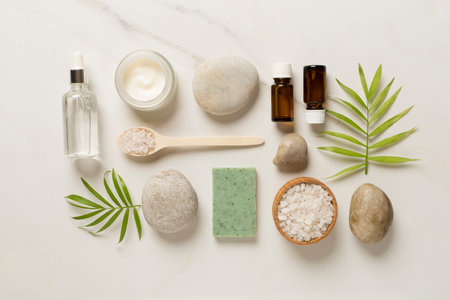Origins of Sustainable Skincare in the UK
Britain’s journey towards sustainable skincare has its roots deeply planted in the nation’s rural landscapes and long-standing traditions. Long before eco-beauty became a buzzword, communities across the UK relied on nature’s larder for their daily skincare needs. From the rolling Cotswold hills to the misty moors of Scotland, British households turned to home remedies passed down through generations. These remedies often featured locally foraged herbs—such as chamomile, lavender, and nettle—infused into simple balms and soothing teas.
The tradition of using natural ingredients was not just about beauty; it was woven into the fabric of everyday life. Grandmothers would steep rose petals to create gentle facial tonics, while herbalists in market towns blended infusions for everything from dry skin to sunburn. These time-honoured rituals reflected a mindful respect for the land and an understanding that true wellness stems from balance between body and environment.
As British culture evolved, so did its approach to self-care. Yet, at its heart, sustainable skincare remained rooted in local wisdom—a blend of practicality and reverence for nature. This enduring connection to homegrown solutions set the stage for today’s modern eco-beauty movement, where sustainability is more than a trend; it’s a return to cherished customs that have stood the test of time.
2. The Rise of Conscious Consumerism
Over the past two decades, the UK has witnessed a significant transformation in the way people approach skincare. This shift, rooted in growing public awareness, has seen British consumers move away from conventional beauty products and towards options that are not only kinder to their skin but also to the planet. Clean ingredients, cruelty-free testing, and ethical production have become central to purchasing decisions—reflecting both a lifestyle choice and a moral stance.
Tracing the Shift in Public Awareness
The evolution began as more Britons became aware of what they were applying to their skin. Ingredient lists, once overlooked, started to matter. The demand for transparency led brands to disclose sourcing methods and manufacturing processes. This movement was further propelled by documentaries, social media campaigns, and celebrity endorsements highlighting issues like animal testing and microplastics in cosmetics.
Key Aspects of Conscious Consumerism in the UK
| Aspect | Description | Impact on Skincare Choices |
|---|---|---|
| Clean Ingredients | Preference for natural, non-toxic formulations free from parabens, sulphates, and synthetic fragrances. | Increased demand for botanical-based products; growth of “free-from” labels. |
| Cruelty-Free Products | Avoidance of brands that test on animals or use animal-derived ingredients. | Rise in certifications such as Leaping Bunny; greater popularity of vegan skincare lines. |
| Ethical Production | Focus on fair trade sourcing, sustainable harvesting, and eco-friendly packaging. | Support for local artisans and small British businesses committed to green practices. |
Influences Shaping Consumer Choices
The collective consciousness around sustainability is shaped by a unique blend of local heritage and global trends. In Britain, there’s a nostalgic appreciation for traditional remedies—think rose water or chamomile-infused creams—paired with a modern insistence on ethical standards. Environmental concerns such as plastic pollution in the English countryside and marine life preservation along the British coastlines have also played pivotal roles in shaping attitudes. These factors together have empowered UK consumers to seek out skincare that aligns with their values, paving the way for eco-beauty brands to flourish.
![]()
3. Local Sourcing and British Botanicals
As the UK’s sustainable skincare movement has evolved, local sourcing has taken centre stage, reconnecting modern eco-beauty with its roots in the British countryside. Increasingly, homegrown brands are looking to native botanicals—plants that have flourished on these isles for centuries—not only for their beauty benefits but also for their low environmental impact. By harnessing the power of ingredients like lavender from Norfolk, chamomile from Kent, and rose from Yorkshire, British skincare companies are championing both sustainability and regional heritage.
Lavender is a classic example: this fragrant flower is not only soothing for the senses but also known for its calming and anti-inflammatory properties on the skin. Sourced from family-run farms, British lavender supports local agriculture while reducing the carbon footprint associated with imported ingredients. Similarly, chamomile, long celebrated in traditional remedies for its gentle healing touch, now finds its way into eco-friendly formulations designed to nurture sensitive skin types.
The iconic English rose remains another hero ingredient. Grown in carefully tended gardens and estates across the country, rose petals yield antioxidant-rich extracts that hydrate and rejuvenate without harsh chemicals or synthetic fragrances. By prioritising these locally cultivated botanicals, UK brands can trace every step of their supply chain, ensuring both ethical practices and freshness in every product jar or bottle.
This return to native plants is more than a trend; it’s a reflection of a broader shift towards mindful living. Choosing products enriched with British botanicals means supporting small-scale growers and preserving the natural biodiversity that makes the UK landscape unique. It’s about embracing the slow beauty ethos—one that values quality over quantity and takes inspiration from age-old traditions rooted in respect for nature.
Through these choices, consumers aren’t just caring for their skin; they’re investing in a more balanced relationship with the environment and celebrating what’s best about local British culture—community spirit, craftsmanship, and an enduring connection to the land.
4. Packaging Innovations and Waste Reduction
The UK’s journey toward sustainable skincare has seen a remarkable shift in packaging practices, reflecting both consumer demand and environmental responsibility. Across the high street, eco-conscious shoppers now expect more than just ethically sourced ingredients—they want brands to address the often-overlooked issue of packaging waste.
Refill Stations: Redefining Convenience
Refill stations are becoming increasingly common in British beauty retailers and independent boutiques. These stations invite customers to bring their own containers or purchase reusable bottles, allowing them to top up on cleansers, shampoos, and moisturisers without generating single-use plastic waste. This not only reduces landfill contributions but also reconnects consumers with the ritual of self-care—encouraging mindful consumption with each refill.
Minimal Packaging: Less is More
Sustainable skincare brands are embracing the ‘less is more’ philosophy by minimising unnecessary packaging. Products now frequently arrive in compostable pouches, glass jars, or simple cardboard boxes—often made from recycled materials. The focus is on functionality and elegance, with brands opting for understated designs that reflect a commitment to both style and sustainability. The trend aligns with a broader cultural appreciation for simplicity and environmental stewardship found throughout the UK.
Recycling Initiatives on the High Street
Major high street retailers have introduced in-store recycling schemes, encouraging customers to return empty product containers for responsible disposal or repurposing. Some brands offer loyalty rewards as an incentive for participation. These initiatives not only foster a sense of community responsibility but also educate consumers about circular economies.
Comparison of Sustainable Packaging Approaches
| Approach | Description | Key Benefits | UK Examples |
|---|---|---|---|
| Refill Stations | Customers refill products using reusable containers. | Reduces single-use plastics; encourages repeat visits; personalises experience. | Lush, Neal’s Yard Remedies |
| Minimal Packaging | Simplified, recyclable or compostable packaging materials. | Lowers material usage; easier to recycle; visually appealing minimalism. | Evolve Beauty, UpCircle Beauty |
| Recycling Initiatives | In-store collection of empty containers for recycling or reuse. | Diverts waste from landfill; builds brand loyalty; raises awareness. | The Body Shop, Boots |
Cultural Impact and Consumer Mindset Shift
The increasing prevalence of these packaging innovations reflects a broader transformation in UK consumer habits. Shoppers are not just buying products—they’re investing in values, demanding transparency and genuine efforts toward waste reduction. As refill stations become a familiar sight on the high street and recycling initiatives gain momentum, sustainable skincare continues to evolve as a lifestyle choice rooted in British sensibility: practical, responsible, and refreshingly authentic.
5. The Role of Small Businesses and Independent Brands
In the UK, small businesses and independent brands have become the unsung heroes in the evolution of sustainable skincare. These homegrown enterprises are not only redefining beauty routines but are also challenging larger players to reconsider their environmental impact. By prioritising natural ingredients, minimal packaging, and ethical sourcing, British indie brands are at the forefront of eco-conscious innovation.
Championing Local Ingredients and Traditions
Many independent brands take pride in using locally sourced botanicals and time-honoured remedies passed down through generations. This connection to British heritage not only supports local farmers but also strengthens community ties. From lavender fields in Norfolk to seaweed harvested along the Cornish coast, these brands infuse a sense of place into their products—offering consumers a uniquely British approach to sustainable skincare.
Transparency and Authenticity
Shoppers today crave honesty and transparency, values that small businesses naturally embody. Indie brands often share detailed information about their sourcing practices, manufacturing processes, and sustainability goals. This openness builds trust and fosters loyalty among ethically minded customers, who increasingly favour quality over quantity.
Changing Shopping Habits
The rise of these innovative brands is shifting consumer behaviour across the UK. More people now choose to shop locally, frequent refill shops, or support zero-waste initiatives—habits that collectively reduce carbon footprints and promote mindful consumption. The success stories of British indie skincare labels serve as inspiration, showing that sustainable choices can be both accessible and effective.
The movement led by independent British brands is more than a trend; it’s a lifestyle shift rooted in respect for nature and community. By supporting these pioneers, UK consumers play an active role in shaping a greener, more balanced future for beauty.
6. The Future of Eco-Beauty in the UK
As we look ahead, the future of eco-beauty in the UK appears more dynamic and promising than ever. A growing shift towards zero-waste shops is reshaping how we approach skincare, with refillable containers, solid bar cleansers, and package-free products becoming increasingly mainstream. This movement isn’t just about cutting down on plastic; it’s about embracing a mindful way of living that resonates with the British appreciation for resourcefulness and tradition.
Another key trend is digital transparency. With consumers becoming more conscious about what goes onto their skin, brands are leveraging technology to provide clear information about ingredients, sourcing, and production methods. Apps and QR codes on packaging allow shoppers to trace a product’s journey from farm to face, fostering trust through openness—a value close to the hearts of many in the UK.
Perhaps most significantly, there is a growing integration of wellbeing into daily skincare routines. British consumers are increasingly viewing beauty not as a superficial pursuit but as part of holistic self-care. Brands are responding by offering products that support both skin health and emotional balance—think aromatherapy-infused serums or mindfulness rituals included in product guides. This alignment between outer beauty and inner peace perfectly reflects the British ethos of balanced living.
The Role of Community and Localism
Local communities continue to play a vital role in driving sustainable change. Independent shops, farmers’ markets, and small-batch producers are fostering relationships built on trust and authenticity. These grassroots efforts are empowering consumers to make ethical choices that support the local economy while caring for the environment.
Challenges and Opportunities Ahead
Despite these encouraging trends, challenges remain—such as ensuring affordability and accessibility for all. Yet, with ongoing innovation and community engagement, there is hope that sustainable skincare will become the norm rather than the exception across the UK.
A New Era of Eco-Beauty
The evolution from homemade remedies to modern eco-beauty signals a new era—one where sustainability, transparency, and wellbeing take centre stage. As British consumers continue to demand more from their skincare, the industry is set to flourish in ways that benefit both people and planet alike.

